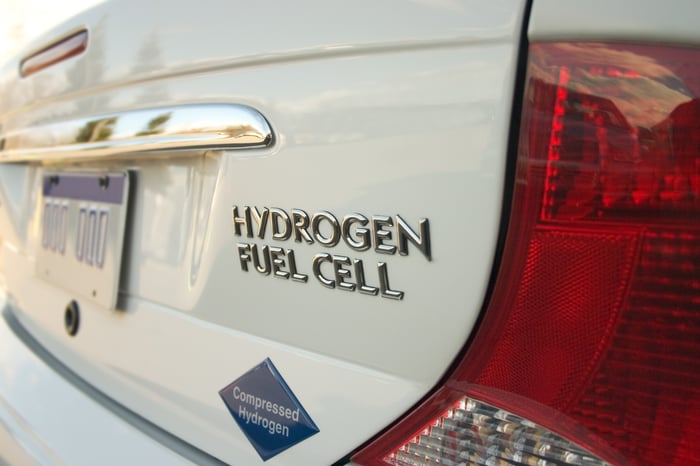For weeks, all eyes have been on the penny stocks and small-cap momentum plays being fueled by retail investors on Reddit and online investing app Robinhood. With emotions ruling the roost, it's not all too surprising to see names like Sundial Growers, AMC Entertainment, and Zomedica getting whipsawed on a daily basis.
What might have flown under your radar is just how well some large-cap stocks have performed in recent months. According to Finviz, there are more than 860 securities with a market cap in excess of $10 billion. Over the past six months, 53 of these large-cap equities have at least doubled in value through Feb. 16.
But for three big companies, a 100% gain would be peanuts. Investors who had the foresight (and perhaps a little bit of luck) to invest $250,000 into the following three large-cap stocks six months ago would have well over $1 million today.

Image source: Getty Images.
NIO: $1.13 million
Tesla is, hands down, the best-known and most successful electric-vehicle (EV) manufacturer. But in terms of sheer momentum, there's probably not an auto stock focused on EVs that's driven more excitement over the past six months than China-based NIO (NIO 0.86%). A $250,000 investment in NIO back in mid-August would be worth about $1.13 million today.
Investors in NIO are simply playing a numbers game. China is the largest auto market in the world, meaning it should also be the largest consumer of EVs. By 2035, the Society of Automotive Engineers of China has estimated that approximately half of all vehicles sold in China will run on alternative energy, of which 95% of will be all-electric. That's an enormous opportunity, and investors are counting on NIO to stake its claim.
NIO's capacity expansion and innovation also came into play in recent months. In January, the company delivered 7,225 EVs, which is a new monthly record and a 352% increase from the same period last year. Management has previously stated that reaching a run-rate of 150,000 deliveries annually is a goal for 2021.
In terms of innovation, NIO is dazzling with the introduction of the EC6 SUV and the ET7 luxury sedan, the latter of which will be available early next year. It's also made waves with the unveiling of a battery-as-a-service program. In exchange for lowering the initial cost of its vehicles, NIO will enroll buyers into a battery upgrade and replacement program, which carries a monthly fee. This will be a smart way for NIO to sacrifice near-term margin for a more loyal customer base and improved long-term operating margins.
Still, NIO isn't anywhere near profitability, and it's sporting a $92 billion market cap despite only producing 82,866 EVs since its inception. That's a nosebleed valuation for an industry that's looking quite frothy.

Image source: Getty Images.
Futu Holdings: $1.44 million
The top-performing large-cap stock over the trailing six months is little-known brokerage and wealth management company Futu Holdings (FUTU 1.25%), which is based in Hong Kong. Shares of the company are closing in on a 500% move higher in recent months, with its market cap creeping up on $26 billion. If you'd invested $250,000 back in mid-August, you'd be sitting on roughly $1.44 million today.
If you're wondering what's behind the more-than-quintupling in Futu's share price, look to the company's lightning-fast operating growth. Without digging too far into the weeds, the company's number of paying clients jumped by 137% to 418,089 in the September-ended quarter, with total revenue rocketed 272% higher to $122 million. The company also saw total client assets jump 178%, with net income skyrocketing to nearly $52 million.
Futu Chairman and CEO Leaf Hua Li attributed the company's exceptional operating performance to heightened market volatility and an increase of high-profile Hong Kong initial public offerings of Chinese companies.
Furthermore, in December, the company announced that a "leading global investment firm" was going to purchase 50 million of its Class A shares in the form of prepaid warrants for a cool $260 million.
While there's been plenty of good news, it's a bit concerning that we haven't heard much of anything from the company over the past two months. I say "concerning," because almost all of its share price appreciation has occurred in the past 60 days. Futu does have high levels of short interest, so it may well be another company caught up in the frenzy that began on Reddit's WallStreetBets forum.
In the meantime, Futu is now lugging around a forward-year price-to-sales ratio of 42. That seems incredibly high considering the political and listing concerns associated with Chinese equities. This seems like a stock to avoid, short of a serious pullback.

Image source: Getty Images.
Plug Power: $1.29 million
A final large-cap stock that's showered its shareholders with robust returns over the trailing six months is hydrogen fuel-cell solutions provider Plug Power (PLUG 5.00%). A $250,000 investment in Plug Power in mid-August would have more than quintupled to $1.29 million as of Feb. 16.
Why Plug Power? The macroeconomic reason is simple: Climate change. As global and domestic temperatures creep up, countries will be looking more closely at alternative energy options to reduce their carbon footprint. With Democrats in control of Congress in the U.S., it's now a lot likelier that we'll see legislation during the Biden administration that promotes or potentially rewards clean-energy businesses.
More specific to Plug Power, it's been an absolute good news factory since the beginning of the year. In no particular order, the company:
- Announced a $1.5 billion equity investment from SK Group that will see the duo focus on integrating fuel-cell solutions into vehicles in South Korea;
- Formed a joint venture with French automaker Renault to target fuel-cell solutions in the light commercial vehicle market in Europe;
- Raised over $2 billion in a bought-deal offering, which pushed its cash balance over $5 billion; and
- Upped both its 2021 sales guidance ($475 million from $450 million) and 2024 gross billings forecast ($1.7 billion from $1.2 billion).
However, Plug Power now sports a nearly $32 billion market cap, equating to 66 times projected sales in 2021. The company is also unlikely to be profitable prior to 2023. While there may not be a lot of downside given how much good news is supporting this stock at the moment, it would appear that Plug's upside may be limited until it proves itself on a larger scale.





